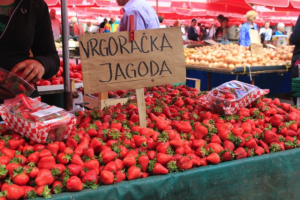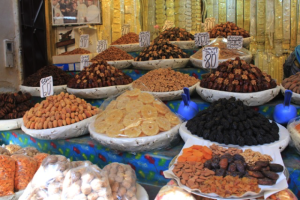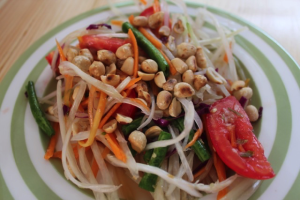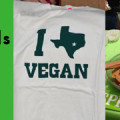Sometimes it’s hard enough just to be vegan in the city you live in, making it hard to even imagine maintaining a vegan diet while traveling abroad. Wanting to keep up a healthy vegan diet might seem difficult and bank-breaking but it surely doesn’t have to be. Even the most meat-heavy of places have something to offer us veggies! You just need to know where to look and how to prepare ahead of time. With a little preparation before take-off and a little research to keep in the back of your head, you’ll have an easy time sticking to your veg lifestyle without going broke.
1. Head to the markets!
The local markets wherever you are will always your best bet for finding fresh and affordable food. Eating meals at the markets is a great way to support the local agriculture of the place you’re visiting while maintaining your budget.
Fruits and vegetables come fresh daily at half the price of those in the supermarkets, and there are often street vendors at the markets selling very cheap quick bites that you can scope out for veggie options. Perusing the markets of Laos you’re sure to come across some vegan coconut pancakes fresh off the grill, wrapped in banana leaves. Or if you’re in Thailand don’t shy away from some 30 Baht veggie Pad Thai!
2. Bring a portable personal smoothie maker.
These nifty little gadgets are surprisingly affordable- and if you have the space in your suitcase or backpack I suggest you bring one (if you know that you’ll have access to electricity!).
You can take the first suggestion of shopping at the market to get some fresh local fruits and greens and throw them right in a smoothie. Find hostels with kitchens so that you can buy in bulk to save time and money and keep the extra in the fridge for future use.
3. Pack lots of safe snacks.
You won’t always be able to find vegan or vegetarian options, as it’s just not part of some cultures. Or perhaps you are able to find one veggie option but it literally is just a plate of steamed morning glory (aka: story of my life in Vietnam). You may also find yourself in a country with a different alphabet system whose language you can in no way recognize, like Cambodia or Bulgaria. In situations like this I suggest going to a local market or convenience shop and loading on cheap snacks that you can easily identify as safely plant based. This includes things like bags of nuts, sunflower seeds, or dried fruits. These are great because they’re durable enough to survive in a backpack and also won’t expire anytime soon.
4. Be prepared with Superfoods.
If you can save up a little room in your backpack or suitcase before you ship out for your trip- head to your local health food store and buy a few plant based super foods for times of need on the road.
Things like chia seeds and goji berries are highly recommended, as they have a long shelf-life, don’t need refrigeration, and can easily fill up your stomach when you need them! Both of these superfoods have very high amounts of crucial nutrients in very small doses
5. Pack a B12 supplement.
Vegans always need to keep in mind the importance of Vitamin B12. Very few foods provide us with this crucial nutrient and deficiencies can lead to serious nerve complications. You don’t want to be caught traveling without it!
You can purchase a large bottle of Vitamin B12 pills and take as many as you need in a small traveller’s pill case. Always remember to take them with food and to stay properly hydrated as it is a water-soluble vitamin.
6. Do your research.
Even in the most remote of places, you might be surprised how much the internet can help you to find places to eat. Of course, Happy Cow is the number one go-to food finder when traveling. I don’t know how I would have survived backpacking in South East Asia without it!
Even just searching the name of your next city with the word vegan or vegetarian can bring you a myriad of different research options. You can read up on eating tips from online traveller’s forums, e-books, and sometimes even city guides.
7. Learn some key phrases.
It’s always good to learn some key words when traveling to foreign country in order to show respect and integrate yourself into the culture. The locals will love it and truly appreciate your effort.
In addition to learning things like “please,” “thank you,” and “goodbye” – it’s often good to learn certain phrases for when you’re dining out. I think by now I’ve learned how to say “I’m vegetarian” in about 15 languages
Many countries don’t have a word for vegan, so I found it helpful to make a card to bring with me to restaurants detailing the things I don’t eat, written in the local language. This is also good for people with food allergies.
For instance if you’re traveling to Argentina and you don’t speak Spanish, print out an index card saying something like “Hi, I’m vegan. That means I cannot eat meat, fish, eggs, milk, dairy (cheese, yogurt, etc), honey, or any other products that come from an animal. Thank you for understanding!”
In Spanish that would be “ Hola, soy vegana, Eso significa que no puedo comer carne, pescado, huevos, leche, productos lácteos (queso, yogur, etc.), miel, o cualquier otro producto que provienen de un animal. Gracias por entender.” This will save you time and sanity, and will also be helpful to the waiters at the restaurant to fully understand your needs without having to try to ask questions across a language barrier.
Even just utilizing one of these seven tips could make your life so much easier whether you’re far from home or only a few miles away. If you’re traveling for a long time you’ll want to stretch out the contents of your wallet as long as you can but don’t compromise your health or your veggie principals for money.
If you do a little planning ahead and research into the area you’re going you’ll be able to stay healthy and well fed, and be able to avoid going broke!
Some of these tips can even be taken back home with you. When you’re home hit up your closest farmers market and support your own local agriculture! Buy produce in bulk to save money and stalk up on shelf-happy super foods!
About the author: Julie Donoghue is the Content Manager for The Purple Carrot, a vegan meal delivery service based in Boston, Massachusetts. She is a food and nutrition blogger with a BA in Communication and a certificate in Plant Based Nutrition. A passionate and curious world traveler, Julie also adores hiking, cycling, baking, and being by the waterside.









No Comments